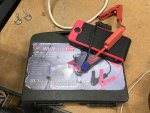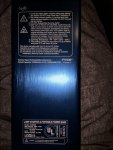I'm kinda doubting it, unless things have changed since I got a degree in electronics decades ago.
First off a capacitor can only charge up to the voltage presented to it by the battery or the power supply supplying DC voltage to it.
Second, it takes a pretty fair sized capacitor to store up a really useable amount of current.
A capacitor's storage potential, which is called it's capacitance, is measured in units called farads.
And a 1-farad capacitor can store one coulomb of charge at 1 volt DC, since capacitors block (store) DC and pass AC. . A coulomb is 6.25e18 (6.25 * 10^18, or 6.25 billion billion)
electrons.
And one amp is defined as a rate of electron flow of 1 coulomb of electrons per second, so a 1-farad capacitor can hold 1 amp-second of electrons at 1 volt DC. .
Lastly a 1 full Farad capacitor is generally pretty big. Somewhere between the size of a can of soda and a 2 liter bottle of soda, depending on the type of capacitor (Mylar, Tantalum, Paper, Electrolytic, Glass, Air, Paper, etc. ) and depending on the voltage it can handle. That's why most capacitors are measured in microfarads (millionths of a farad), or Pico Farads (billionths of a Farad) .
Take a look at the start/run caps on a AC motor like on an HVAC unit for example, or a table saw, etc. They are pretty big.
I just can't see one of these so called "Super Capacitor Jump Starters" being hooked up to a dead battery (some claim to work with a 12 Volt car battery down as low as 3 volts!) , one so dead that it won't even make the starter solenoid on the car click or turn on the head lights, but somehow it will charge up this super capacitor in just 90 seconds from the "reserve capacity that all dead batteries have" as one ad put it, then delivering the 12 VDC at 200 to 400 or more amps to turn over a cold engine, especially like one ad says "Works down to as low as -40 degrees F!".
I'm probably an out dated dinosaur, and the technology has passed me by, but the physics just ain't there in my feeble mind.
When the well is dry, you can't get more water out of it, when the battery is dead, you can't get more voltage and current out of it by hooking a capacitor of any size to it.
Just my .02 worth, one of the young whippersnappers here , like that smart aleck apprentice of mine, will probably be along shortly to prove me wrong!



















